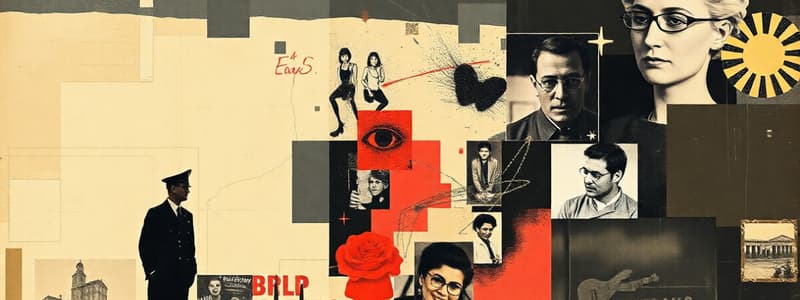Podcast
Questions and Answers
What did Immanuel Kant believe was necessary to achieve perpetual peace?
What did Immanuel Kant believe was necessary to achieve perpetual peace?
- The promotion of absolute sovereignty among states.
- The cessation of all wars immediately.
- The development of republican constitutionalism. (correct)
- The establishment of a global military force.
What was a significant outcome of the First World War in regard to liberal thinking?
What was a significant outcome of the First World War in regard to liberal thinking?
- The rejection of international cooperation.
- The belief that peace is an inherent human condition.
- A shift towards recognizing peace as a construct. (correct)
- The establishment of a permanent military alliance.
According to Ikenberry, what does Liberalism 3.0 entail?
According to Ikenberry, what does Liberalism 3.0 entail?
- A move towards global institutions that govern international relations. (correct)
- A return to the principles of Liberalism 1.0.
- A reinforced focus on sovereignty among nation-states.
- An expansion of military alliances to maintain order.
What did the framers of the UN Charter recognize as essential for international relations?
What did the framers of the UN Charter recognize as essential for international relations?
What was Woodrow Wilson's most notable advocacy related to international relations?
What was Woodrow Wilson's most notable advocacy related to international relations?
What is the primary focus of Marxist theories in world politics?
What is the primary focus of Marxist theories in world politics?
In world systems theory, what characterizes the international economy?
In world systems theory, what characterizes the international economy?
Poststructuralism is primarily concerned with which aspect of knowledge?
Poststructuralism is primarily concerned with which aspect of knowledge?
What do postcolonial scholars critique about Eurocentric theories?
What do postcolonial scholars critique about Eurocentric theories?
What is a defining characteristic of feminist theories?
What is a defining characteristic of feminist theories?
What distinguishes explanatory theories from constitutive theories?
What distinguishes explanatory theories from constitutive theories?
What is a foundationalist view regarding truth claims?
What is a foundationalist view regarding truth claims?
What is a primary goal of decolonial scholarship?
What is a primary goal of decolonial scholarship?
What was one outcome of the withdrawal of colonial powers in Africa during decolonization?
What was one outcome of the withdrawal of colonial powers in Africa during decolonization?
What characterized the decolonization process in Asia?
What characterized the decolonization process in Asia?
Which event marked the first major confrontation of the Cold War?
Which event marked the first major confrontation of the Cold War?
The founding of the state of Israel is associated with which major event?
The founding of the state of Israel is associated with which major event?
What was a prominent effect of the Cold War on nuclear weapons?
What was a prominent effect of the Cold War on nuclear weapons?
How did the end of the Cold War influence Europe's political landscape?
How did the end of the Cold War influence Europe's political landscape?
What challenge did Brexit pose to Europe?
What challenge did Brexit pose to Europe?
What was one result of the unipolar system established after the Cold War?
What was one result of the unipolar system established after the Cold War?
What does Robert Cox argue about the nature of global politics?
What does Robert Cox argue about the nature of global politics?
According to Robert Cox, what impact does inequality have on society?
According to Robert Cox, what impact does inequality have on society?
What role do International Financial Institutions play in the global economy?
What role do International Financial Institutions play in the global economy?
What do critics of postmodern thought argue about positivism?
What do critics of postmodern thought argue about positivism?
How do multinational corporations (MNCs) function according to the critiques presented?
How do multinational corporations (MNCs) function according to the critiques presented?
What is the perspective on climate crisis from the content presented?
What is the perspective on climate crisis from the content presented?
What argument do postmodern thinkers make regarding knowledge creation?
What argument do postmodern thinkers make regarding knowledge creation?
What is a critique of the policies of rich countries in global trade?
What is a critique of the policies of rich countries in global trade?
What do Marxists believe about society's tendency for conflict?
What do Marxists believe about society's tendency for conflict?
What concept did Robert Cox emphasize in relation to hegemony?
What concept did Robert Cox emphasize in relation to hegemony?
What does the concept of 'uneven and combined development' suggest?
What does the concept of 'uneven and combined development' suggest?
What is a core belief of feminism regarding subordination?
What is a core belief of feminism regarding subordination?
What does the Combahee River Collective Statement advocate for?
What does the Combahee River Collective Statement advocate for?
What tension is noted within the feminist movement?
What tension is noted within the feminist movement?
What is a primary characteristic of New Marxism?
What is a primary characteristic of New Marxism?
How is civil society defined in the context provided?
How is civil society defined in the context provided?
Flashcards are hidden until you start studying
Study Notes
Marxist Theories
- The most important aspect of global politics is the global capitalist system, which is marked by significant inequality.
- Marxist theories view global politics as the arena where class struggles take place.
- World-systems theory posits that the international economy is structured around a core of wealthy capitalist nations, a semi-periphery, and an exploited periphery. The periphery provides cheap labor and resources for the core.
### Poststructuralism
- Poststructuralist theories challenge grand narratives or metanarratives that claim to have absolute access to the truth.
- They question the concepts and methods used to understand global politics and the conditions that shape our understanding.
### Postcolonial and Decolonial Approaches
- Postcolonial scholars question the validity of Eurocentric theories in explaining global politics, particularly considering the historical role of colonialism and empire.
- Decolonial scholarship focuses on deconstructing dominant theories and ways of knowing that are rooted in colonialism.
### Feminism
- Feminist theories are diverse, but they share a focus on how gender differences are constructed within hierarchies of power.
Meta-Theoretical Questions
- Explanatory theory sees the world as independent from our theories, while constitutive theory argues that our theories shape and construct the world.
- The foundational/anti-foundational distinction pertains to whether truth claims can be evaluated against objective criteria:
- Foundationalist: believes all truth claims can be judged true or false.
- Anti-foundationalist: rejects the idea of neutral grounds for judging truth claims.
### Decolonization
- Decolonization processes varied greatly, from relatively peaceful transitions to violent revolutionary wars.
- In Africa, some colonial powers withdrew while attempting to maintain influence, while others, like France in Algeria, refused to leave, leading to war.
- The rise of nationalism and the relationship between nationalism and revolutionary Marxism played a crucial role in many decolonization movements in Asia.
Cold War
- The Cold War was a period of intense rivalry between the United States and the Soviet Union.
- It reflected a breakdown of the agreements reached at the Yalta and Potsdam conferences.
- Notable events included: the Berlin Blockade, the Korean War, the rise of Mao Zedong in China, the founding of Israel, and the Cuban Revolution.
Transformation of Warfare
- Industrialized total war emerged as a result of technological, political, and social forces.
- Nuclear weapons became a central element of international politics and spurred efforts toward political agreements to control their use.
### The End of the Cold War
- The end of the Cold War ushered in a unipolar system with the United States as the dominant power.
- The US pursued a policy of globalization, promoting economic integration and eliminating trade barriers.
- This led to the rise of China and India as major global actors.
- The breakup of the USSR posed challenges, particularly under Putin's leadership.
- Europe, especially Germany, benefitted significantly from the end of the Cold War with the formation of the European Union.
- The third world, seeking independence from the West, aimed to develop alternative paths to economic modernity.
### Liberalism and the International Order
- The democratic peace thesis posits that democracies are more peaceful in their international relations.
- The First World War led to a shift in thinking towards recognizing that peace must be actively constructed.
- The League of Nations, proposed by Woodrow Wilson, aimed to manage international relations but ultimately failed.
- The United Nations replaced the League, with its charter emphasizing the need for consensus among great powers.
### Ikenberry and Liberalism
- Ikenberry's framework outlines three stages of liberalism:
- Liberalism 1.0: Idealist moment of the interwar period marked by the failed attempt to establish a rule of law order.
- Liberalism 2.0: The US integrated liberal principles into the UN Charter and established institutions for trade and cross-border cooperation.
- Liberalism 3.0: Calls for a shift from sovereignty-based order towards one where global institutions have greater authority.
### Crises of the Liberal Order
- Some argue that internationalist principles of the postwar liberal order are facing a crisis.
### Marxism and Global Politics
- Marxists argue that society is inherently prone to class conflict.
- Feminist Marxists highlight the role of women in maintaining capitalist relations.
### Gramsci and Hegemony
- Gramsci emphasizes the role of cultural hegemony, where the dominant class's values and beliefs are accepted by subordinate groups.
- Civil society – the network of institutions outside the state – plays a crucial role in maintaining hegemony.
### New Marxism
- New Marxist scholarship re-engages and reinterprets Marxist concepts.
- Justin Rosenberg’s work on uneven and combined development builds upon Trotsky’s analysis of Russia in the global political economy.
- Uneven and combined development suggests that different countries follow unique paths to economic and political development, influenced by the international context.
### Realism
- Realism, a dominant theory in international relations, views states as rational actors driven by self-interest and power.
- The concept of anarchy, the absence of a central authority, is central to realist thinking.
- Realists prioritize national security and emphasize the importance of military power.
### Feminism and Global Politics
- Feminist theories analyze the global subordination of women in various spheres: economic, political, physical, and social.
- They advocate for equality and justice for all women.
- The Combahee River Collective Statement addresses the intersection of race, gender, and class oppression, highlighting the specific experiences of Black women.
### Robert Cox and Global Politics
- Cox views Marxism from a materialist perspective, emphasizing the role of economic structures, including education and professional fields.
- He argues that global politics is characterized by interdependence and inequality rather than anarchy.
### Global Inequality
- Global inequality is rooted in systemic issues, including:
- Domination of international financial institutions by wealthy nations.
- Influence of wealthy countries on world trade.
- Historical legacy of colonialism.
- Predatory practices of multinational corporations. - Exploitation of labor and resources. - The environmental degradation associated with capitalist systems, contributing to the climate crisis.
### Postmodernism and Poststructuralism
- Postmodern and poststructuralist thinkers challenge the idea of objective knowledge.
- They argue that our understanding of the world is shaped by our experiences, biases, and theoretical frameworks.
### HI, MHI, LI, MLI
- HI: High Income
- MHI: Middle High Income
- LI: Low Income
- MLI: Middle Low Income
Studying That Suits You
Use AI to generate personalized quizzes and flashcards to suit your learning preferences.




